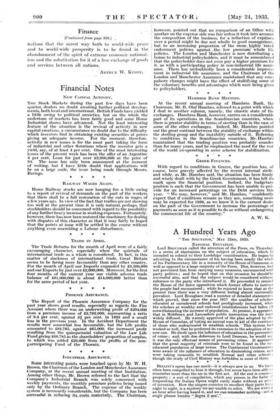A Hundred Years Ago
" THE SPECTATOR," MAY 23RD, 1835.
NATIONAL EDUCATION.
Lord BROUGHAM called the attention- of the Peers, on Thursday, to a series of resolutions on -the subject or education, Which he intended to submit to their Lordships' consideration. He began by adverting to t'he cireumstance of his having been nearly the whole of his Parliamentary life in a minority of the House of Commons, as well as opposed to a large majority of the Peers. This, however, had not prevented him from 'carrying many measures, unconnected with party politics ; and he hoped that on this occasion he 'should' be successful also, and that the subject would be considered without reference to the party who introduced it He proceeded to remind the House of the fierce opposition which former efforts to instruct the people had encountered ; while he rejoiced to know that at the present time third-wee a very different feeling almost universally prevalent. Lord $rougham read a number of detailed statements ; which proved, that since' the year 1817' the number of scholars educated at unendowed schools had prodigiously increased, while the scholars at wealthy and endowed establishments had fallen oft notwithstanding the increase of population. At present, it appeared, that in Middlesex and Lancashire public instruction was the least widely diffused. He warmly approved of the plan adopted by the House of Commons, of itaing an annual sum in aid of the exertions of those who endeatieured to establish .schools.' This -System had worked so well, that he preferred its extension to the adoption of any new one. He dwelt upon the Influence of education in the prevention of crime ; and, with due deference to Lord Denman, he would say it was the only effectual means of preventing crime. It appeared that the great majority of criminals were to be found in the un- educated population of large towns. The Continental Governments were aware of the influence of education in diminishing crimes, and . were taking measures to establish Normal and other schools ; though the study of Civil History was forbidden in most of them.
* * *
BELLINI'S opera has one merit—it is always new to us. We have often been compelled to hear it through, but.never have been able to remember more than the air in the first act. All the rest is common property ; a sort of compilation; which any person in the habit of frequenting the Italian Opera: might easily make without an atom of invention. - How the "singers contrive to recollect their parts irolu night to night, is a mystery ivi3 'are unable to solve. We are writing an hour after having heard' it, and- we-canzemember nothing—not a single phrase besides "...fiopra _ - _














































 Previous page
Previous page